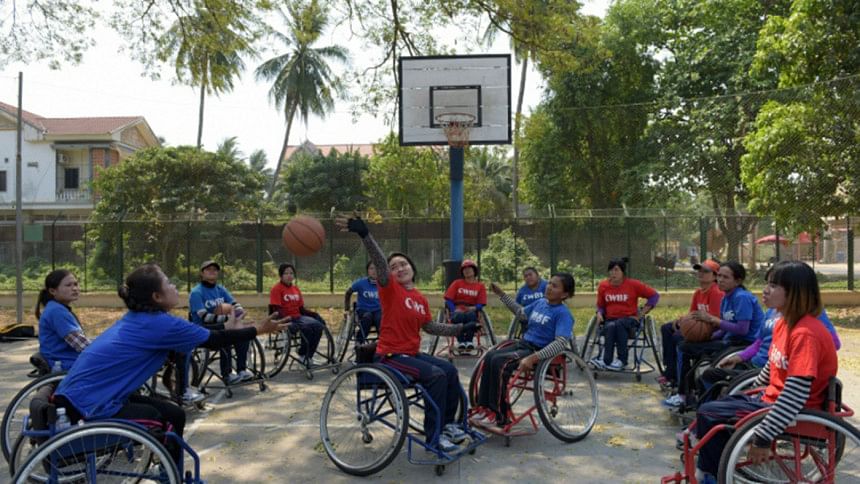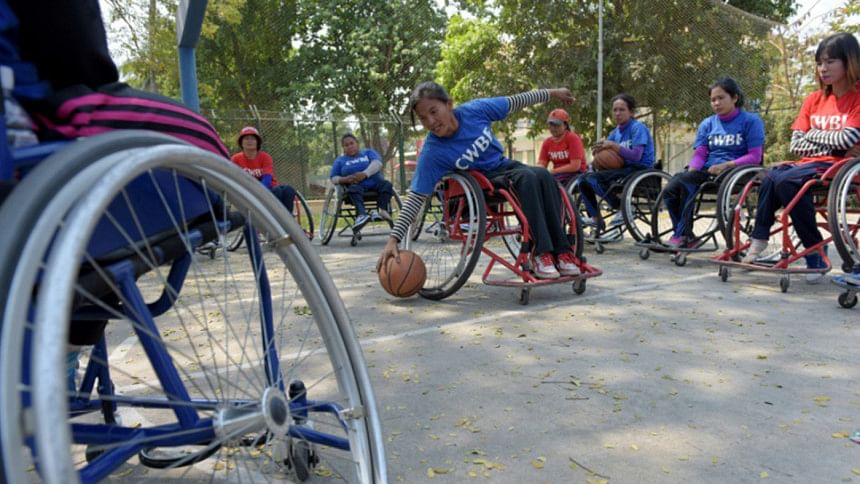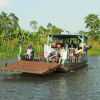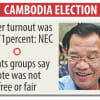Hoop dreams of Cambodia's disabled cagers

Slamming into each other with a metallic crunch, Cambodia's first women's wheelchair basketball team are changing attitudes to disability in a nation where unexploded landmines claim new victims every week but physical impairments are scorned.
Under a baking sun in the western city of Battambang, two all-female sides are battling it out.
Yelps and laughter fill the air, but the game is as ruthless as any professional bout with sweat-drenched players dexterously maneuvering their chairs to block an opponent or find a crucial opening.
At one point a player is knocked from her chair and sent sprawling to the floor. But she quickly dusts herself off, pulls herself back in and scores minutes later.
A few years ago most of these women languished at home, unable to find work, shunned by their own communities in a country where the disabled are often seen as a burden.
"The first type of discrimination is discouragement from families," explained Sieng Sokchan, the team's captain, who was paralysed at 10 when she was struck in the back by a stray bullet outside her home.
To this day she does not know who fired the weapon.
"They look down on us disabled people as incapable of doing anything or of working -- or they feel ashamed when they go out because they have a disabled kid or relative."
Many of the players had little confidence when they started, she explained. But sport has helped to change that -- and has also affected the way people view them.
Last year some team members jetted off for a tournament in Malaysia, a move that Sieng Sokchan said astounded her neighbours.
"They said to us 'Oh you are better, you boarded a plane, you visited a foreign country'," the captain said, breaking out into a grin.
Loss and loneliness
Three decades of war has left impoverished Cambodia awash with mines. And while significant steps have been taken to clear unexploded ordnance in the last decade, the country still has one of the world's highest proportion of amputees.
An estimated 25,000 people have lost limbs in explosions, according to figures from the mine clearance charity Halo Trust.
At a Red Cross run prosthetics factory just a short walk from the basketball court where the women are practising, some 80 percent of patients seeking replacement limbs are still landmine victims.
Lors Nimol, a 34-year-old mother of one and now regular team member, lost a leg while clearing forest in an area close to the Thai border that was once a Khmer Rouge guerilla stronghold.
She knew the work was dangerous, but needed the cash.
"When I was not disabled, people employed me to pick beans," she told AFP in a break between practice. "Suddenly I had no job and no money."
In a country where one in five remain below the poverty line, the loss of a single earner through injury can deliver a significant financial shock to a family and often leaves the disabled shunned even by loved ones.
Lors Nimol says basketball has given her a reason to get out of the house.
"Before when I did not play basketball, I was at home lonely," she explained.
Hoop dreams
Buoyed by their enthusiasm for the game, the women are now setting their sights on a lofty goal: qualifying for the 2020 Paralympics in Tokyo.
"It's definitely something we can aim for. Why not?" said Philip Morgan, head of the International Committee of the Red Cross' physical rehabilitation programme in Cambodia, which helps run the women's team, as he watched and cheered from the sidelines.
Japan is more than just wishful thinking, Morgan insisted. Last year the ICRC got a men's basketball team from Afghanistan to compete in the qualifiers for Rio.
They didn't make it through but it was a major milestone in a tournament many impoverished nations feel is skewed in favour of wealthy countries.
The charity has been helping a women's team get up and running both in Battambang and the southern town of Kampong Speu for the last two years, organising the Malaysia tournament and visits from foreign coaches.
They are currently preoccupied with the crucial task of setting up the country's first official wheelchair basketball federation, a move that will enable them to begin competing professionally.
"It's not enough for them to just train, I want them to get a bit more exposure, both internally but also internationally as well," said Morgan.
While bringing home an Olympic medal may be a long ways off for Sieng Sokchan's squad, basketball is already transforming their lives off the court.
"Since I started playing sport my life has changed from loneliness and hopelessness to one filled with hope and joy," she said.
"And there is now no discrimination in the family."


 For all latest news, follow The Daily Star's Google News channel.
For all latest news, follow The Daily Star's Google News channel. 








Comments